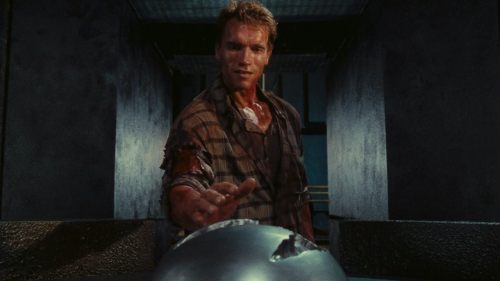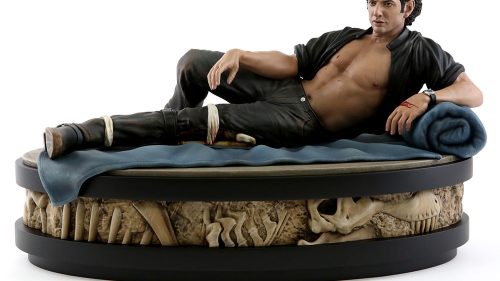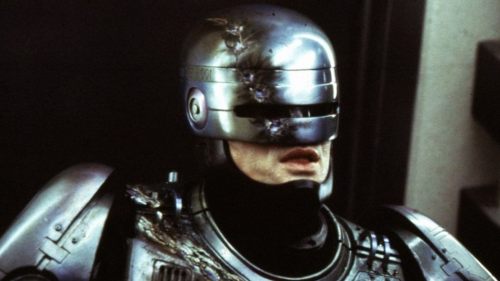Badass Hall Of Fame: Paul Verhoeven
This is a story Paul Verhoeven tells about growing up in the Netherlands during the Nazi occupation of World War II:
I was with a friend, I was 6 then, playing in the street. We were playing in the street and climbing the wall of a house that belonged to the Dutch National Socialist Party. So let’s say a house that was Nazi oriented. Then a kubelwagen came in - a German jeep - with Dutch and German soldiers, and the Dutch soldiers were in German uniforms. They were collaborators. They said, ‘Climb off this wall,’ and we got off the wall. They said, ‘Put your nose against the wall. We’re going to shoot you.’ And then we did that. And they started laughing and saying it was a joke. I peed in my trousers. I went home and I said, ‘Mommy, I peed in my trousers.’ When I told them what happened they got frightened, because it could have been the other way, isn’t it? There was not always an enormous humanistic aspect to the German occupation.
There’s something very Paul Verhoeven about that story - except in a Paul Verhoeven movie there would have been more nudity and violence before it was all over.
In 2000 Verhoeven’s career imploded with the terrible film Hollow Man, but before that - and in the single movie he has made since then - the Dutch director staked a claim at the extreme edge of mainstream filmmaking. Explicit sex and gory violence and the blackest of humor are the signatures of Verhoeven.
That experience as a boy in WWII certainly marked him; his parents’ home in The Hague was near German rocket launch sites, and their neighborhood was often the target of Allied bombings. The neighbors’ house was leveled. Burning corpses in the streets were not an uncommon sight.
It seems likely that these experiences led Verhoeven to his cinema of the extreme. It definitely led to the darkly comic cynicism of his films; WWII convinced the filmmaker that the basic element of the universe is violence. Talking to the Guardian he said:
"We all should realise that we live in an extremely violent universe, isn't it? If you look at the sky with the Hubble telescope, you will see galaxies hitting each other. Just think of the amount of life that every moment is being destroyed. It is basically our destiny to be destroyed.”
Verhoeven didn’t intend to be a filmmaker. He was drawn to mathematics as a young man, and graduated from school with degrees in math and physics. But while in university Verhoeven, who had grown up an avid filmgoer, discovered the joy of making movies. He worked over the next few years to get into film - while a conscript in the Dutch navy he made an award-winning documentary - and finally his big break happened in 1971, with Business is Business - a not very great film that nobody liked.
But Verhoeven bounced back with Turkish Delight, a film that should be seen as his real debut. From the first five minutes you recognize Verhoeven’s signatures: Rutger Hauer dreams of murdering people before masturbating to a picture glued to his wall (“I’ll lick the shit from your asshole,” he says to it). Leaving his apartment he picks up a random woman, brings her home for vigorous sex and only tells her his name after tracing the outline of his cock on paper, like a child making a hand-print Thanksgiving turkey.
Turkish Delight was a major hit at home and made a big splash in the United States. The film was nominated for Best Foreign Film at the 1974 Academy Awards (losing to Truffaut’s Day For Night). Rutger Hauer and Verhoeven both were launched.
The two teamed a few more times; Soldier of Orange, Verhoeven’s first WWII movie, would get a Golden Globe nomination, while Spetters (translated as Hunks) would garner a ton of controversy for its explicit homosexuality*. It’s also a film that shows Verhoeven’s thoughts on religion; later in life he would become the only non-academic member of the Jesus Seminar (more on that later!).
Spetters was Verhoeven’s second to last Dutch film, and for the next decade and a half he would work in Hollywood, where he would find his true calling in huge blockbusters that he somehow saturated with his own extremism, sarcasm and misanthropy.
Flesh & Blood was his first American film, and his last with Rutger Hauer. The little-seen medieval film is a trial run for Verhoeven in the USA; very violent, it’s the sort of movie where Rutger Hauer rapes Jennifer Jason Leigh and she falls in love with him. But this was just a warm-up. If the Dutch period of his career had produced some great films, the American period of his career was about to produce some masterpieces.
Robocop. Total Recall. Basic Instinct. Starship Troopers. Over the course of a decade these would be the films that Verhoeven made. In there is also Showgirls, a film that was wildly misunderstood at the time but that has been embraced as a camp classic since.
In many ways all of Verhoeven’s Hollywood work is roundly misunderstood. The in-your-face nature of sex and violence in his films usually leads the stuffier critics to ignore him. Meanwhile, the people who are drawn to those elements in his movies sometimes miss the deeper levels of satire on which he’s working. Not one of his Hollywood action movies should be taken at face value - he’s always smirking just behind the camera - but it’s possible that he doesn’t telegraph that enough to the cheap seats. While Robocop’s satirical elements are fairly obvious, Total Recall’s sly jabs at the Schwarzenegger action hero archetype usually go unnoticed. Let’s put it this way: Verhoeven knows that Doug Quaid is an everyman, and that Schwarzenegger is no everyman.
The misunderstanding of Starship Troopers is epic. Only in recent years has the film begun to be viewed as the trenchant, meticulous satire it truly is. Upon release The Washington Post editorialized against the film, saying that it was Nazi in nature - an astonishing misread. Many have criticized the terrible acting and teen heartthrob nature of the casting, utterly failing to recognize the purposeful blandness of the leads, and the way that Verhoeven uses their innocuous nature to bring us towards cheering on genocide. Looking at the film now it’s almost ridiculous to think that people didn’t get it, but many simply did not.
That’s the genius of Verhoeven. There’s a gleeful quality to the mayhem and sex in his films that edges on dumb, but he’s actually incredibly smart and knows exactly what he’s doing. There’s a slyness to almost all of Verhoeven’s films (except Hollow Man. That’s really just junk) that is easily missed in the splatter and fucking. Even Showgirls is a movie that has been extraordinarily misunderstood - yes, it’s like that ON PURPOSE. It’s a vicious attempt to undermine Hollywood’s starmaking mythology. What Starship Troopers is for military science fiction, Showgirls is for the backstage story.
It’s fair to say that when he got to Hollywood Verhoeven began to lose his taste for human stories. His Dutch work was very small scale and about individuals, but his best Hollywood work is more about humanity in general - a group he does not seem to hold in high regard. While he has a biting disdain for humanity, Verhoeven’s best work leavens that with action or titillation; it’s the lack of fun elements that makes Hollow Man, one of Verhoeven’s most misanthropic films, so hard to stomach.
That his career in Hollywood imploded should come as no surprise. Verhoeven was making the most expensive movies of all time at his peak, and that sort of overreach would doom a Verhoeven character. Showgirls was his stumble, but Hollow Man was the film that finished him. He returned to The Netherlands.
There he made one last film, one that brought together the humanity of his early Dutch work and the spectacle of his Hollywood films. Black Book is the concluding chapter in his strange WWII trilogy, a film that returns him to the Dutch resistance that he explored in Soldier of Orange. While I think Robocop and Starship Troopers jostle for the title of Verhoeven’s masterpiece, Black Book might be the single best movie he’s made. It manages to be both nuanced and extraordinarily explicit in the best Verhoevian manner.
Over the last few years Verhoeven has been trying to make a movie called Jesus The Man; in 1985 he joined the Jesus Seminar, a group of academics dedicated to exploring the historical Jesus. Verhoeven is the only non-scholar in the Seminar, but he’s been an active member; recently he published a book called Jesus of Nazareth, which presents some interesting ideas about the historical Christ. I don’t agree with every conclusion that Verhoeven reaches, but his research is strong and his reasoning often good. It’s not one of the great theological volumes, but it’s a terrific work for a layman interested in the historical Christ. Who would have thought the guy who made Showgirls would have that in him.
Anybody who was paying attention, probably. Verhoeven has always straddled the high and the low, happy to revel in bodily fluids while talking about bigger concepts and taking aim at big targets. He made a trilogy of extroardinary science fiction classics, all of which have been remade or are in the process of being remade - likely because Hollywood continues to underestimate not only how good they are, but how smart they are.
I hope that Verhoeven gets back to filmmaking soon. He’s making a gimmick movie as part of a Project Greenlight-ish TV show right now, but I’d like to see him sinking his teeth into something bigger. It’s time for Verhoeven to come back to Hollywood, to remind the summer blockbuster mavens that you can have explosions, squibs, tits and smarts all in the same movie.
* which is ironic, considering that gay groups would go batshit over the portrayal of a lesbian in Basic Instinct.



